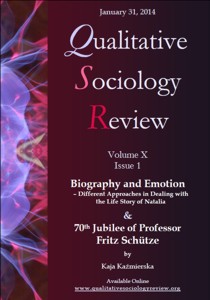A Situation, a Narrative, and a Life History. The Case of Natalia
DOI:
https://doi.org/10.18778/1733-8077.10.1.02Keywords:
Biographical Analysis, Autobiographical Narrative, Trajectories of Suffering, Background Construction, Pre-coda CommentaryAbstract
I will first focus on problems which might emerge in narrative interviews with people who have experienced long-term trajectories of suffering, before discussing the researcher’s specific style of doing this particular biographical interview – a style which is marked by sensibility and considerateness, but might contain some problems nevertheless. Afterwards, I will deal with two formal features of the interviewee’s introductory narrative – a complicated background construction and an extended pre-coda commentary – in order to reveal the analytical significance of these features for a deeper understanding of the interviewee’s life history and her way of making sense of her experiences. The article ends with a discussion of some topics which are relevant for an analytical abstraction.
Downloads
References
Bartelt, Guillermo and Bärbel Treichel, (eds.). 2012. Don Decker’s Apache Odyssey. Approaches to Autobiography, Narrative, and the Developing Self. Berlin: Frank & Timme.
Google Scholar
Betts, Sandra et al. 2008. “Biographical Counselling: an Introduction.” European Studies on Inequalities and Social Cohesion 1/2:5-58.
Google Scholar
Glaser, Barney and Anselm Strauss. 1967. The Discovery of Grounded Theory. Chicago: Aldine.
Google Scholar
Kallmeyer, Werner and Fritz Schütze. 1977. “Zur Konstitution von Kommunikationsschemata der Sachverhaltsdarstellung.” Pp. 159-274 in Gesprächsanalysen, IKP-Forschungsberichte. Reihe I, Vol. 65, edited by D. Wegner. Hamburg: Buske.
Google Scholar
Kaźmierska, Kaja. 2002. “Narratives on World War II in Poland: When a life story is family history.” The History of the Family 7(2):281-305.
Google Scholar
DOI: https://doi.org/10.1016/S1081-602X(02)00096-9
Kaźmierska, Kaja. 2012. Biography and Memory. The Generational Experience of the Shoah Survivors. Boston: Academic Studies Press.
Google Scholar
Miller, Robert and Graham Day, (eds.). 2012. The Evolution of European Identities. Biographical Approaches. Houndmills, Basingstoke: Palgrave Macmillan.
Google Scholar
Moritz, Karl Philipp. 1977. Anton Reiser. Ein psychologischer Roman. Stuttgart: Reclam. (First edition: Berlin 1785).
Google Scholar
Riemann, Gerhard. 1987. Das Fremdwerden der eigenen Biographie. Narrative Interviews mit psychiatrischen Patienten. Munich: Fink.
Google Scholar
DOI: https://doi.org/10.30965/9783846723968
Riemann, Gerhard. 2000. Die Arbeit in der sozialpädagogischen Familienberatung. Interaktionsprozesse in einem Handlungsfeld der sozialen Arbeit. Weinheim and Munich: Juventa.
Google Scholar
Riemann, Gerhard, (ed.). 2003. Doing Biographical Research. Forum Qualitative Sozialforschung / Forum: Qualitative Social Research 4(3). Retrieved August 27, 2013 www.qualitative-research.net/index.php/fqs/issue/view/17
Google Scholar
Riemann, Gerhard. 2007. “Suizidalität als Prozess. Eine Re-Analyse des Tagebuchs von Wallace Baker in Ruth Shonle Cavans ‘Suicide.’” Zeitschrift für Qualitative Forschung 8(2):287-327. Retrieved August 27, 2013 http://nbn-resolving.de/urn:nbn:de:0168-ssoar-269962
Google Scholar
Riemann, Gerhard and Fritz Schütze. 1991. “‘Trajectory’ as a Basic Theoretical Concept for Analyzing Suffering and Disorderly Social Processes.” Pp. 333-357 in Social Organization and Social Process. Essays in Honor of Anselm Strauss, edited by D. R. Maines. Hawthorne, NY: Aldine de Gruyter.
Google Scholar
Rosenthal, Gabriele, (ed.). 1997. Der Holocaust im Leben von drei Generationen. Familien von Überlebenden der Shoah und von Nazi-Tätern. Giessen: Psychosozial Verlag.
Google Scholar
Rosenthal, Gabriele. 2005. Interpretative Sozialforschung. Eine Einführung. Weinheim and Munich: Juventa.
Google Scholar
Schröder-Wildhagen, Anja and Fritz Schütze. 2011. “How to deal with autobiographical narrative interviews in the Euroidentity Research Project.” Sociologcial Review 60(1):41-91.
Google Scholar
Schütze, Fritz. 1981. “Prozessstrukturen des Lebensablaufs.” Pp. 67-156 in Biographie in handlungswissenschaftlicher Perspektive. Kolloquium am sozialwissenschaftlichen Forschungszentrum der Universität Erlangen-Nürnberg, edited by J. Matthes et al. Nuremberg: Verlag der Nürnberger Forschungsvereinigung.
Google Scholar
Schütze, Fritz. 1987. Das narrative Interview in Interaktionsfeldstudien: Erzähltheoretische Grundlagen. Teil I: Merkmale von Alltagserzählungen und was wir mit ihrer Hilfe erkennen können. Hagen: Studienbrief der Fernuniversität.
Google Scholar
Schütze, Fritz. 1992. “Pressure and Guilt: War Experiences of a Young German Soldier and their Biographical Implications.” International Sociology 7(2):87-208 (part I) and 7(3):347-367 (part II).
Google Scholar
DOI: https://doi.org/10.1177/026858092007003006
Schütze, Fritz. 1995. “Verlaufskurven des Erleidens als Forschungsgegenstand der interpretativen Soziologie.” Pp. 116-157 in Erziehungswissenschaftliche Biographieforschung, edited by H. H. Krüger, W. Marotzki. Opladen: Leske + Budrich.
Google Scholar
DOI: https://doi.org/10.1007/978-3-663-09430-2_7
Schütze, Fritz. 2008a. “Biography Analysis on the Empirical Base of Autobiographical Narratives: How to Analyse Autobiographical Narrative Interviews – Part I.” European Studies on Inequalities and Social Cohesion 1/2:153-242. Retrieved August 27, 2013 www.uni-magdeburg.de/zsm/projekt/biographical/1/B2.1.pdf
Google Scholar
Schütze, Fritz. 2008b. “Biography Analysis on the Empirical Base of Autobiographical Narratives: How to Analyse Autobiographical Narrative Interviews – Part II.” European Studies on Inequalities and Social Cohesion 3/4:5-77. Retrieved August 27, 2013 www.uni-magdeburg.de/zsm/projekt/biographical/1/B2.2.pdf
Google Scholar
Downloads
Published
How to Cite
Issue
Section
License

This work is licensed under a Creative Commons Attribution-NonCommercial-NoDerivatives 4.0 International License.











